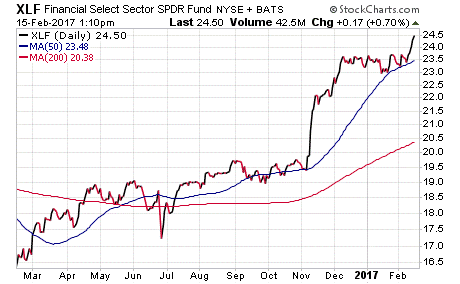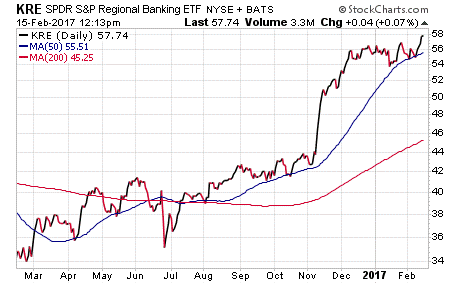Even Leftists are Embracing the Trump Trade

Haters are gonna hate, as the kids these days say. But the smart haters are going to hate while also making money.
That’s precisely what leftist icon and billionaire manipulator of markets, George Soros, has decided to do.

Soros also bought some $3.1 million shares of the Financial Select Sector SPDR (XLF).
The moral of the story here is though you may love or hate a certain fact of reality, your money doesn’t care.
Your money, and your investing decisions, should always be objective.
That means that regardless of how you feel about a given fact of reality — especially about a particular politician in office, or a particular policy, or a particular law — if there is an investable angle associated with that fact, it needs to be evaluated for possible inclusion in your portfolio.
In broader, philosophic terms, this is consistent with the axiom I live by called the “primacy of existence.” All this really means is that you see the world for what it is, i.e. facts are facts, independent of how we might want them to be.
Right now, the market is trading Trump on. That’s a fact of reality that investors fail to acknowledge at their own financial peril… and even haters like George Soros know that.
ETF Talk: This Fund Features Small-Cap Banks
By Eagle Staff
Continuing our series on exchange-traded funds (ETFs) in the financial sector, we are featuring SPDR S&P Regional Banking ETF (KRE).
KRE tracks an equal-weighted index that exclusively tracks U.S. regional banks. You may remember our previously covered SPDR S&P Bank ETF (KBE), which is the sister fund of KRE, and has a greater focus on large-cap stocks.
KRE’s equal-weighting strategy means that the fund is more biased towards small-cap and mid-cap banks, but also encompasses single-stock-related factors that have less influence on the fund’s performance. This is what separates KRE from popular peer financial funds such as Financial Select Sector SPDR ETF (XLF), which is heavily dominated by large-cap companies.
As a result, KRE’s profile is often not as impacted by many factors that are known to drive performance of big Wall Street banks. With a sizable $3.86 billion in total assets and a substantial daily trading volume of $387.11 million, KRE is a popular and highly liquid fund. The fund has a reasonable expense ratio of 0.35% and a stable dividend yield of 1.48%.
From the chart below, you can see that KRE got off to a slow start in 2016 but climbed sharply in November from around $42 to $56, or 33%, in the last few months. For comparison, the financial sector’s overall one-year return is 31.62% and the S&P 500’s one-year return is 17.45%.

As a non-diversified fund, KRE is 100% invested in the financial industry. It has close to 90 holdings in its portfolio, without going over 5% in any one single holding.
Some of its holdings include M&T Bank Corp. (MTB), 3.80%; PNC Financial Services Group Inc. (PNC), 3.79%; SunTrust Banks Inc. (STI), 3.73%; Regions Financial Corp (RF), 3.64%; and Citizens Financial Group Inc. (CFG), 3.64%.
KRE can be used as a vehicle for investors to diversify their portfolio and as a bet on the strength of the U.S. economy. If you wish to participate in the active financial sector, we encourage you to research SPDR S&P Regional Banking ETF (KRE) as a possible addition to your portfolio.
As always, we are happy to answer any of your questions about ETFs, so do not hesitate to send me an email. You just may see your question answered in a future ETF Talk.
Confident People Don’t Look Down
I’m a horseman, and I take pride in learning about myself from one of the best teachers on earth — the horse.
You see, the horse is a herd animal, and one that has evolved over hundreds of thousands of years to thrive in its group social structure. The horse also is an animal that requires leadership, as the highest-ranking mares (and sometimes the stallions) in the herd are leaders, directing the movement of the group to different grazing areas or water sources.
In “natural horsemanship” of the kind I practice, the horseman is tasked with taking the “lead mare” role. By doing so, the horseman must provide the leadership to his/her beloved animals that they require to survive and flourish.
This method works well, provided the horseman has the requisite confidence in his/her knowledge and skills, and provided he/she has accepted the responsibility of assuming the lead mare role.
Confidence here is perhaps the most important ingredient, but confidence only comes after you’ve done the hard work to acquire the knowledge and skill necessary to justly assume that confident lead-mare swagger.
Have you ever noticed that truly confident people walk with their heads up?
Think about that for a moment. Have you ever known a confident person that’s always looking down? The answer is almost certainly no, and the reason why is because confident people don’t look down. They look up, and they take on life as the lead mare.
That lead mare role is one that I assume not only with my horses, but also with my approach to investing, and to helping readers to this publication, as well as subscribers to my Successful ETF Investing advisory service.
After more than two decades in this industry, I know I have built up the requisite knowledge and skill needed to be the lead mare when it comes to helping investors grow and protect their money.
That’s why you’ll always get the sense from me through my writing, my speaking events, and if you ever meet me in person, that I am the type of person who never looks down when I walk.
If you want to run alongside me with the confidence of wild horses through the 2017 financial markets, then I invite you to check out my Successful ETF Investing advisory service right now.
Don’t Run from Struggle
“Who you are is defined by what you’re willing to struggle for.”
— Mark Manson
A lot of people spend a lot of time avoiding something that’s unavoidable in life, and that is struggle. Rather than avoid struggle, I choose to embrace it to its fullest extent. You see, as humans, we are defined by what we are willing to struggle for. Whether it is financial success, family success, social success, etc., the values you are willing to fight fiercely for tells you who you really are. So, don’t run from struggle. Instead, step right up to the challenge and take the action necessary to prevail. In doing so, you’ll discover what real happiness is.
Wisdom about money, investing and life can be found anywhere. If you have a good quote you’d like me to share with your fellow readers, send it to me, along with any comments, questions and suggestions you have about my audio podcast, newsletters, seminars or anything else. Click here to ask Jim.
In case you missed it, I encourage you to read my e-letter from last week about how confidence can make you a better investor.
No comments:
Post a Comment